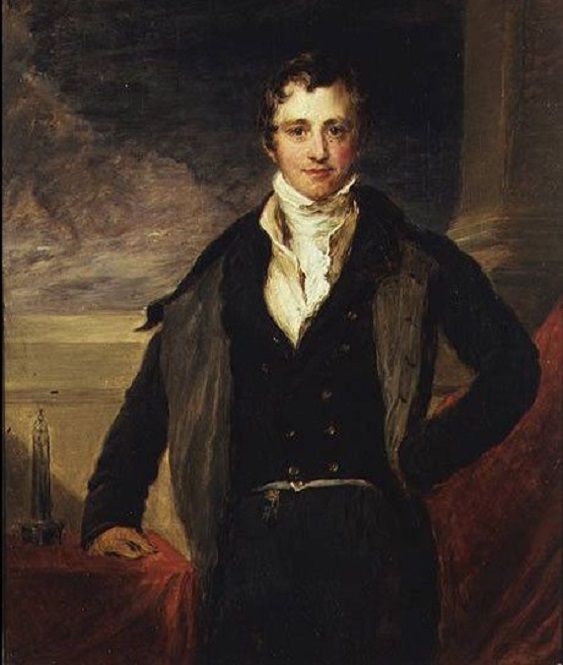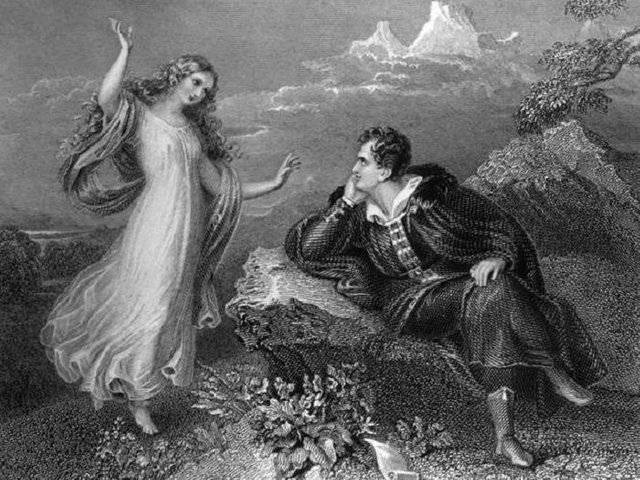The family tree of the Byron family probably originates from an ancient Viking family. The first baron in the family received his noble title in 1643, during the time of the Stuarts, whom he served loyally as a warrior and rises to the rank of General. The grandfather's grandfather was an admiral and is known as a fearless sailor. In May 1785, Captain John Byron married a second time to Kathryn Gordon de Gaut, whose ancestors belonged to a royal family who once ruled Scotland. From his first marriage to Marquis de Carmarthen, who died in 1784, the captain acquired his daughter Augusta Byron. In 1807, she married to Colonel George Lee. George Byron was born in London on January 22, 1788, in the family of the handsome captain known in the world with his beauty and irresponsibility. The marriage between the two spouses does not last long, and they soon divide. George Byron is three years old when his father dies .. The mother of the poet, an unbalanced, sensitive, and angering woman, grows up her only child as she surrounds him with a tyrannical tenderness. From birth or as a result of childhood paralysis, George remains with deformed footsteps - a physical flaw that tortures him throughout his life. Mrs. Byron and her son live in poverty in Aberdeen until May 1798, when George's grandmother died. The baby child becomes the sixth Baron of the Byron family, and inherits the nobility Abbey in Nottingham County. The castle, a former Norman abbey, is in a poor condition and the lands around it are several times mortgaged. Mrs. Byron sends her son at first to the Dulwich School, and then to Harrow, where George is a student. He gained solid knowledge of ancient Greek and Latin, became addicted to classical ancient Greek and ancient Roman authors, studied English literature in the 18th century, showed a keen interest in history and poetry. Despite his physical defect, he is glorified among his classmates as a good swimmer, rider and cricket player.
George Byron was a sensitive adolescent, according to his own confessions, with prematurely developed spiritual generosity, which he manifested in his first love affair for ten years with his cousin, Mary Duff. In the summer of 1803, he fell in love with another cousin, Mary Chowworth, a little bigger than him. This is his first big love, to which he returns in six teenage poems written after his disappointment / Mary's sudden marriage and included in his first lyrical collection "Hours of idleness" . In October 1805, George was already a student at Trinity College. There he established his first serious and important friendships with John Hobhouse, later Lord Broughton, who would be his companion in long walks across Europe and executor of his will, and some of Edwardston, whose early death in October 1811 he experiences painfully and writes the cycle "Poems for the Tirzah". The first collection of Lord Byron appeared in June 1807. In January 1808, in the authoritative then Scottish magazine "Edinburgh Revealed", a destructive review was made against the poet's book. With his inherent incredulity and militant fervor, George Byron wrote a genius of vengeful satire, directed both to his anonymous blasphemer and to romantic poets. It is with the challenging title "English Bards and Scottish Critics". In September 1808, George Byron settled in the castle of his father's Newsted family. Hhe was adopted as a protagonist of a full member of the House of Lords. Then he and his faithful friend Hobhouse took his first "big tour" across Europe - crossing Portugal and Spain, reaching Malta, then settling in Albania as a guest of local despot Ali Pasha. In September 1809, he was already in Athens, where he moved to Asia Minor, stayed for two months in Constantinople, and in July 1810 he returned to Athens. He traveled to Greece until April 1811, studied her past, learned ancient Greek culture, recorded his impressions, wrote poems. As he wanders through Greece, he adapts and translates into English Horace's "Poetic Art", writes his "Memories of Horace," writes his exuberant satire "The Curse of Minerva" against his compatriot Lord Elgin, who takes the surviving friezes from the Parthenon's pediment transported to England. During this journey, Byron leads a diary, which offers, after long hesitation, the young London publisher John Murray. After reworking and translating into the poems his impressions of "the great tour," Byron offers Murray the first two songs of his poem "The Wandering of Child Harold", which date back to 12 March 1812. The poem has an incredible success, preceded by the young Lord's first fiery speech before the House of Lords. George Byron suddenly gains prominence, and his poetic talent is now indisputable to the then English readers. Only in 1812 his poem for Child Harold was reissued five times.
This rapid universal recognition of the talent of the young poet, his submissive physical beauty and his habitual elegance of eccentric dandy make George Byron an idol for young vain London aristocrats. Some uninhibited admirers of the once-honored poet make him famous for a fashionable worldly lover, engage him in complicated salute intrigue, taking advantage of his youthful enthusiasm for success. At the beginning of 1812, George was fascinated by romantic Lady Carolyn Lembe, who, after their first meeting, deliberately announced his admiration by the handsome young lord: "This beautiful pale face will be my destiny!" That same year the London aristocracy was lively about and perhaps embellished deliberately Bayron's love adventures with Lady Oxford, twenty years older than Byron, and with Lady Frances Webster. The saloon intrigue entangles attributed the author of the poem to Child Harold the scandalous glory of the conqueror of the female hearts. George Byron is warmly welcomed in the halls and clubs, including a number of loyal friends like Sheridan, Thomas Moore, Samuel Rogers, and Thomas Campbell. Byron confirms his poetic gift in the secular and literary circles with his lyo-epic cycle, called by some explorers of his work "Eastern poems". As an example of the success of this series of poems, we can note that about 10000 copies of the book were sold at London's bookshops on the day of the Corsair's appearance.
She Walks In Beauty
by George Gordon Byron
She walks in Beauty, like the night
Of cloudless climes and starry skies;
And all that's best of dark and bright
Meet in her aspect and her eyes:
Thus mellowed to that tender light
Which Heaven to gaudy day denies.
One shade the more, one ray the less,
Had half impaired the nameless grace
Which waves in every raven tress,
Or softly lightens o'er her face;
Where thoughts serenely sweet express,
How pure, how dear their dwelling-place.
And on that cheek, and o'er that brow,
So soft, so calm, yet eloquent,
The smiles that win, the tints that glow,
But tell of days in goodness spent,
A mind at peace with all below,
A heart whose love is innocent!
After a long separation in the summer of 1813, George Byron met again his sister Augusta Lee, born of his father's first marriage. Some connoisseurs of the life of the famous English poet suggest that they have had a passionate attachment to each other, which was commented as "strange brotherly love". As proof of it, the Byron poems of Augusta, his letters to her, and the letters and confessions of the nurse to the brother to the old Lady Melbourne, a close friend of Augusta, were accepted. Malicious gossip shows the suspicion of a blood-friendly intimate relationship between them. Some are inclined to accept that Augusta's daughter is a child of George Byron. For some critics, this thesis is acceptable because the motif of incest love affection was present in three works by Byron. At the express urge of Augusta Lee, Byron's inheritor's dear friend, Hobhouse, ordered his memoirs to be burned, in which some intimate confessions of the poet, uncomfortable with the "sister," were probably recorded. The young Lord is besieged by numerous creditors, the lands around his castle, Newstead Abei, are mortgaged, his noble ambition is exposed to humiliating trials. According to some biographers, Byron decides to marry to save his own and family's aristocratic honor. His loyal friend Lady Melbourne urged him to form a marriage union with his wealthy niece Anne Isabella. The wedding ceremony took place on 2 January 1815, but at the beginning of their cohabitation, the bridegroom faces financial difficulties, which give rise to constant disagreements between them.


Good article. I'm really happy to find your blog among all these crypto maniac blogs. I didn't know about the nature of his relation with Augusta. Maybe that explains why he decided to leave Britain and dismiss his soul in a war between Greeks and Turks. I would like to add Lady Lamb's quote about him: "He is mad,bad and dangerous to know."
Downvoting a post can decrease pending rewards and make it less visible. Common reasons:
Submit
Thank you, I'm glad you appreciate it.
Yes, that quote tells everything :D
Downvoting a post can decrease pending rewards and make it less visible. Common reasons:
Submit
The malicious rumours add to the beauty of his poems.
Downvoting a post can decrease pending rewards and make it less visible. Common reasons:
Submit
Yes, nn some sense you are right :)
Downvoting a post can decrease pending rewards and make it less visible. Common reasons:
Submit
Nice post . Keep it up. Check out my post https://steemit.com/teardrops/@godlyalfred/3apzxl-the-night-crawler-continuation
Downvoting a post can decrease pending rewards and make it less visible. Common reasons:
Submit
thanks
Downvoting a post can decrease pending rewards and make it less visible. Common reasons:
Submit
You got a 6.18% upvote from @postpromoter courtesy of @godflesh!
Want to promote your posts too? Check out the Steem Bot Tracker website for more info. If you would like to support the development of @postpromoter and the bot tracker please vote for @yabapmatt for witness!
Downvoting a post can decrease pending rewards and make it less visible. Common reasons:
Submit
Great biography. Another of my favourites 😊
Downvoting a post can decrease pending rewards and make it less visible. Common reasons:
Submit